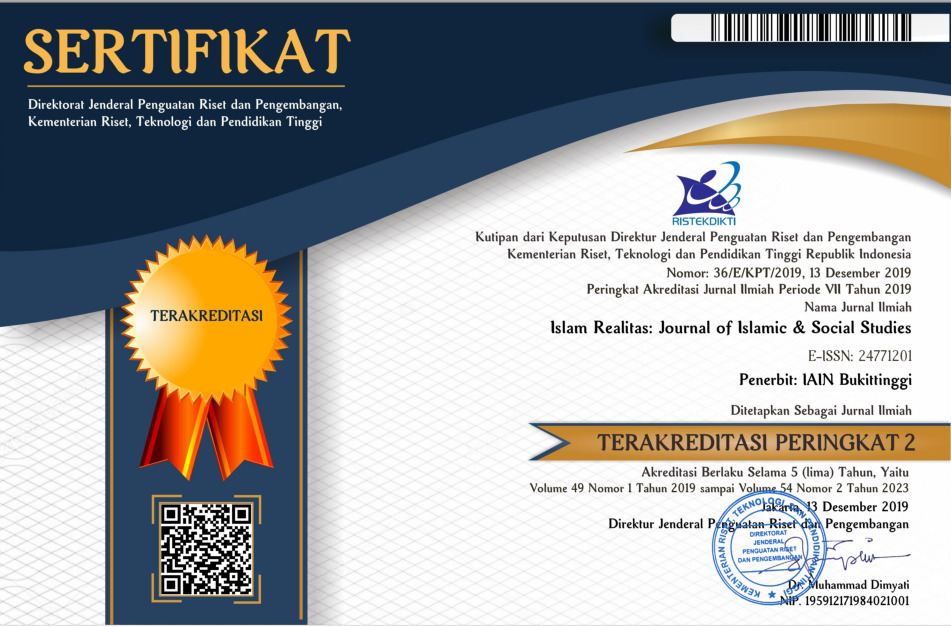The Role of Public Sphere According to Jurgen Habermas’s Perspective for Multicultural Societies in the Indonesian Context
DOI:
https://doi.org/10.30983/fuaduna.v3i2.2548Abstract
References
Adiwijaya, Dominique Rio. “Perbandingan antara Etika Jürgen Habermas dan Richard Rorty sebagai Prinsip Dasar Bertindak Manusia.†Humaniora 1, no. 2 (October 30, 2010): 205–12. https://doi.org/10.21512/humaniora.v1i2.2862.
Budiarti, Tirsa. “Model-Model Pendidikan Perdamaian Bagi Anak Dalam Konteks Gereja.†Jurnal Jaffray 16, no. 1 (March 18, 2018): 55–76. https://doi.org/10.25278/jj71.v16i1.280.
Ferree, Myra Marx, William A. Gamson, Jürgen Gerhards, and Dieter Rucht. “Four Models of the Public Sphere in Modern Democracies.†Theory and Society 31, no. 3 (2002): 289–324.
Gumelar, Fajar, and Hengki Wijaya. “Peran Gereja Masa Kini Menyikapi Teologi Pembebasan Gutiérrez.†BIA’: Jurnal Teologi Dan Pendidikan Kristen Kontekstual 2, no. 1 (June 24, 2019): 14–26. https://doi.org/10.34307/b.v2i1.69.
Gunawan, Ketut, and Yohanes Rante. “Manajemen Konflik Atasi Dampak Masyarakat Multikultural Di Indonesia.†Jurnal Mitra Ekonomi Dan Manajemen Bisnis 2, no. 2 (2011): 212–24.
Habermas, Jürgen. Between Naturalism and Religion: Philosophical Essays. Cambridge, UK ; Malden, MA: Polity Press, 2008.
———. The Structural Transformation of the Public Sphere: An Inquiry into a Category of Bourgeois Society. 10. print. Studies in Contemporary German Social Thought. Cambridge, Mass: MIT Press, 1999.
———. “Three Normative Models Of Democracy.†Constellations 1, no. 1 (December 1994): 1–10. https://doi.org/10.1111/j.1467-8675.1994.tb00001.x.
Habermas, Jürgen, and William Rehg. Between Facts and Norms: Contributions to a Discourse Theory of Law and Democracy. 1 MIT Press paperback ed., 4. printing. Studies in Contemporary German Social Thought. Cambridge, Mass.: MIT Press, 2001.
Hamid, Abu. “Semangat Islam Dalam Kebudayaan Orang Bugis-Makassar.†Jurnal Jaffray 4, no. 1 (June 1, 2006): 16–24. https://doi.org/10.25278/jj71.v4i1.129.
Helaluddin, Helaluddin, and Hengki Wijaya. Analisis Data Kualitatif: Sebuah Tinjauan Teori & Praktik. Makassar: Sekolah Tinggi Theologia Jaffray Makassar, 2019.
Kanna, Armin Sukri. “The Implementation of Incarnational Mission Among The Bugis Using Cultural Approach.†Jurnal Jaffray 12, no. 1 (April 1, 2014): 93–127. https://doi.org/10.25278/jj71.v12i1.34.
Karman, Yonky. “Abraham Inklusif: Sebuah Titik Temu Trialog Agama-agama Abrahamik.†Jurnal Jaffray 17, no. 2 (September 30, 2019): 185–202. https://doi.org/10.25278/jj.v17i2.321.
Kawamura, Koichi. “Consensus and Democracy in Indonesia : Musyawarah-Mufakat Revisited.†SSRN Electronic Journal, 2011. https://doi.org/10.2139/ssrn.2280935.
Kristianto, Paulus Eko, and Hengki Wijaya. “Tilikan Politik Dan Hak Asasi Manusia Di Era Globalisasi.†Preprint. Open Science Framework, November 5, 2019. https://doi.org/10.31219/osf.io/u5rg7.
Laar, Ester van, Alexander J.A.M. van Deursen, Jan A.G.M. van Dijk, and Jos de Haan. “The Relation between 21st-Century Skills and Digital Skills: A Systematic Literature Review.†Computers in Human Behavior 72 (July 2017): 577–88. https://doi.org/10.1016/j.chb.2017.03.010.
Ngelow, Zakaria J. “Turut Membina Indonesia Sebagai Rumah Bersama - Peran Gereja Dalam Politik Di Indonesia.†Jurnal Jaffray 12, no. 2 (October 2, 2014): 213–34. https://doi.org/10.25278/jj71.v12i2.16.
Noor, Irfan. “Identitas Agama, Ruang Publik Dan Post-Sekularisme: Perspektif Diskursus Jurgen Habermas.†Ilmu Ushuluddin 11, no. 1 (2012): 61–87.
Nurmadiah, Nurmadiah, Sitti Sakinah, Helaluddin Helaluddin and Hengki Wijaya. “Enhancing Students’ Motivation to Learn Arabic Through Method of Muhadharah.†In First International Conference on Culture, Education, Linguistics and Literature, CELL 2019. Purwokerto, Central Java, Indonesia: EAI, n.d. https://doi.org/10.4108/eai.5-8-2019.2289818.
Panggarra, Robi. “Konflik Kebudayaan Menurut Teori Lewis Alfred Coser Dan Relevansinya Dalam Upacara Pemakaman (Rambu Solo’) Di Tana Toraja.†Jurnal Jaffray 12, no. 2 (October 1, 2014): 291–316. https://doi.org/10.25278/jj71.v12i2.20.
Prasetyo, Antonius Galih. “Menuju Demokrasi Rasional: Melacak Pemikiran Jürgen Habermas Tentang Ruang Publik.†Jurnal Ilmu Sosial Dan Ilmu Politik 16, no. 2 (2012): 169–84.
Supartiningsih, Supar. “Etika Diskursus Bagi Masyarakat Multikultural: Sebuah Analisis dalam Perspektif Pemikiran Jürgen Habermas.†Jurnal Filsafat 17, no. 1 (March 22, 2017): 32–59. https://doi.org/10.22146/jf.23231.
Supriadi, Yadi. “Relasi Ruang Publik Dan Pers Menurut Habermas,†n.d., 20.
Ulinnuha, Roma. “Islam, Ruang Publik Dan Kerukunan Antar Umat Beragama (Studi Tradisi Ngebag Kolaboratif Di Karangjati Wetan).†Jurnal Sosiologi Agama 9, no. 2 (March 17, 2017): 29. https://doi.org/10.14421/jsa.2015.092-02.
Weismann, Ivan Th.J. “Naturalisasi Perbudakan Sebagai Suatu Keadilan.†Jurnal Jaffray 1, no. 1 (January 5, 2005): 29. https://doi.org/10.25278/jj71.v1i1.166.
Wijaya, Hengki, and Arismunandar Arismunandar. “Pengembangan Model Pembelajaran Kooperatif Tipe STAD Berbasis Media Sosial.†Jurnal Jaffray 16, no. 2 (October 6, 2018): 175–96. https://doi.org/10.25278/jj71.v16i2.302.
Zaluchu, Sonny, Stephanus Karnadhi, Fransiskus Widjaja, and Harls Siahaan. “Legitimation of Religious Symbols in Politics: Descriptive Analysis of The Narration of Indonesian Election Campaign 2019.†Atlantis Press, 2019. https://www.atlantis-press.com/proceedings/icdesa-19/125923250.
Downloads
Published
How to Cite
Issue
Section
Citation Check
License
Authors who publish with this journal agree to the following terms:
- Authors retain copyright and grant the journal right of first publication with the work simultaneously licensed under a Creative Commons Attribution-ShareAlike 4.0. that allows others to share the work with an acknowledgment of the work's authorship and initial publication in this journal.
- Authors are able to enter into separate, additional contractual arrangements for the non-exclusive distribution of the journal's published version of the work (e.g., post it to an institutional repository or publish it in a book), with an acknowledgment of its initial publication in this journal.
- Authors are permitted and encouraged to post their work online (e.g., in institutional repositories or on their website) prior to and during the submission process, as it can lead to productive exchanges, as well as earlier and greater citation of published work (See The Effect of Open Access).





